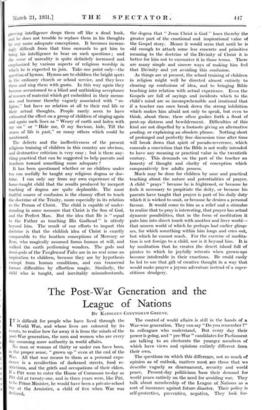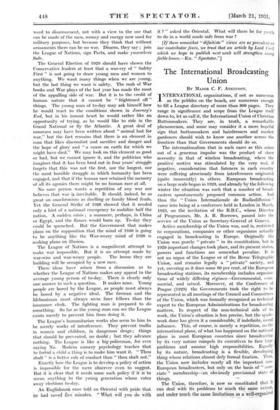The Post-War Generation and the League of Nations
BY KATHLEEN CONYNGHANI GREENE.
IT is difficult for people who have lived through the 1- World War, and whose lives are coloured by its events, to realize haw far away it is from the minds of the post-War generation, the men and women who are every day assuming more authority in world affairs, No man or woman of thirty or under can have been, In the proper sense, " grown up " even at the end of the War. All that war means to them as a personal expe- rience is a recollection of darkened streets, food re-. strictions, and , the griefs and occupations of their elders, If a Pitt were to enter the House of Commons to-day as Pitt did at twenty-one, and in three years were, like Pitt, to be Prime Minister, he would have been a private-school boy at the Armistice, a child of five when War was declared, The control of world affairs is still in the hands of a War-wise generation, They can say "Do you remember ?" to colleagues who understand, But every day their power is going, and " pre-War candidates for Parliament are talking to an electorate the younger members of which have views and opinions entirely different from their own, The questions on which this difference, not so much of opinion as of outlook, matters most are those that we describe vaguely as disarmament, security and world peace, Present-day politicians base their demand for world peace entirely on. the need for avoiding war, They talk about membership of the League of. Nations as a sort of insurance against future.disaster,, Their policy is self-protective, preventive, negative, They look for- ward to disarmament, not with a view to the use that can be made of the men, money and energy now used for military purposes,' but because they think that without armaments there can be no war. Disarm, they say ; join the League of Nations, sign Pacts, and make yourselves Safe. .
The General Election of 1929 should have shown the Conservative leaders at least that a war-cry of " Safety First " is not going to draw- young men and women to anything. We want many things when we are young, but the last thing we want is safety. The rush of War books and War plays of the last year has made the most of. the appalling side- of war. But it is to the credit of human nature that it cannot be " frightened off " things. The young man of to-day may ask himself how he would react to the conditions shown in Journey's End, but in his inmost heart he would rather like an opportunity of trying, as he would like to ride in the Grand National or fly the Atlantic. A great deal of nonsense may have been written about " animal lust for war," but the fact remains that there is an element in man that likes discomfort 'and sacrifice and danger and the hope of glory and " a cause on earth for which we might have died." We may look on this element as good or bad, but we cannot ignore it, and the politician who imagines that it has been bred out in four years' struggle forgets that this was not the first, nor the longest, nor the most horrible struggle in which humanity has been engaged, and that if the human race retained the memory of all its agonies there might be no human race at all.
No sane person wants a repetition of any war nor believes that war is inevitable. • It should, indeed, be as great an anachronism as duelling or family blood feuds. Yet the General Strike of 1926 showed that it needed only a hint of a national emergency to mobilize half the nation. A sudden crisis ; a massacre, perhaps, in China or Egypt, and the flames would burn up: To-day they could be quenched. But the Government that makes plans on the supposition that the mind of 1940 is going to be anything like the War-weary mind of 1920 is making plans on illusion. • The League of Nations is a magnificent attempt to make war impossible. But it is an attempt made by war-wise and war=weary people. The house they are building will be occupied by a' new race.
These - ideas have arisen from a discussion as to whether the League of Nations makes -any appeal to the average young person of to-day. There is clearly only one answer to such a question. It makes none. Young people are bored by the League, as people must always be bored by a negative ideal. The - fireman and the lifeboatman must always seem finer fellows than the insurance clerk. The fighting man is prepared to do something. So far as the young man can see the League exists merely to prevent him from doing it.
The League's humanitarian works also seem to him to be merely works of interference. They prevent traffic in women and' children, in dangerous • drugs ; things that should be prevented, no doubt ; but they advance nothing. The League • is like a big rioliceman, for ever saying No. Modern nursery psYchology. teaches that to forbid a child a thing is to make him want it. " Thou shalt " is a better rule of conduct than " thou shalt not." Exactly how the League is to deirelop npolicy of action is impossible for the mere observer even to suggest. But it is clear that it needs some such policy if it is mean anything to the young generation whOse votes sway elections to-day.
An Englishman once told an Oriental with pride that he' had saved five minutes. " What will you do with it ? " asked the Oriental. What will there be for youth to do in a world made safe from* War ?
' [If theSe somew 'hat "defaitiste" views are as prevalent as Our contribUtor fears, we trust that an article by Lord Cecil which. we hope to publish next week will strengthen Many feeble knees.—En. "Spectator."]



















































 Previous page
Previous page